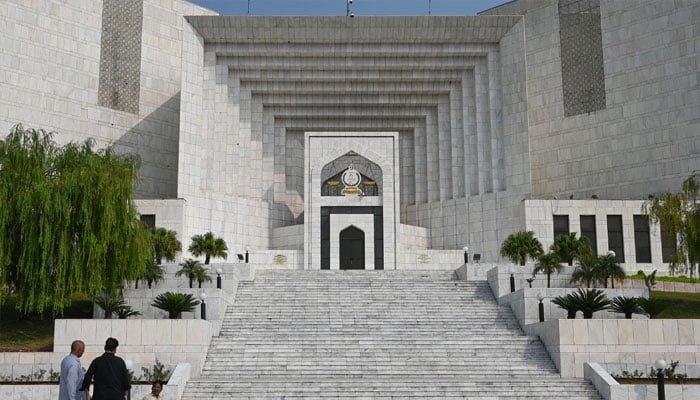Constitutional benches
Dissenting voices reflect complexity of balancing judicial independence with institutional reforms
With the inauguration of Pakistan’s first seven-member constitutional bench, Justice Amin-ud-Din Khan will lead the bench in interpreting cases that fall strictly under Article 191A. This development, following the passage of the 26th Amendment, aims to channel politically charged cases to specific constitutional benches, thereby allowing other benches to focus on the everyday grievances of the public. Yet, despite the apparent clarity of purpose, the division within the Supreme Court may open up further questions on the effectiveness of this new system. Dissenting voices reflect the complexity of balancing judicial independence with institutional reforms. Legal experts note that high-profile political cases often consumed a relatively small percentage of the apex court’s docket, though they garnered disproportionate media attention. Thus, the perception of political cases dominating judicial priorities may have been as much a media construct as a genuine case overload. But perception, in this instance, carries as much weight as reality, particularly when judicial credibility is at stake. For the general public, who depend on the Supreme Court for justice in non-political matters, the hope is that this division will expedite cases long sidelined by high-profile hearings.
This expectation is valid but may require patience. As Justice Mansoor Ali Shah pointed out in a recent hearing, the process of transferring cases to designated benches still lacks procedural clarity, a byproduct of the amendment’s newness. Questions surrounding how and when cases are delegated will require time to clarify as judicial practices align with this structural change. It is only with time that clear jurisprudence will emerge, guiding which cases belong to the regular bench and which to the constitutional bench. However, it is the long-standing issue of judicial politicisation that perhaps most urgently needs addressing. Those who criticise the 26th Amendment as a threat to judicial independence should remember that accusations of political bias have, in fact, long plagued the institution. If constitutional benches offer even a partial remedy to these perceptions, they will serve an essential function.
Nevertheless, the constitutional bench is no cure-all. Justice should be dispensed impartially, whether a case is deemed political or not. The creation of these specialised benches does not absolve the judiciary of its duty to uphold rule of law across all cases. If anything, it should reinforce the judiciary’s commitment to focus on justice above political influences, allowing parliament and politicians to carry out their responsibilities without judicial interference. As the country embarks on this new chapter of judicial bifurcation, much will depend on how quickly and effectively the Supreme Court adapts. If these constitutional benches can demonstrate swifter processing of cases without compromising justice, this model may well become a progressive step in judicial reform. If, however, they merely add to institutional fragmentation, the judiciary’s credibility may suffer further. For now, we can only hope it will lead the Supreme Court closer to what it should ideally represent: an impartial, apolitical guardian of the constitution.
-
 Leonardo DiCaprio's Co-star Reflects On His Viral Moment At Golden Globes
Leonardo DiCaprio's Co-star Reflects On His Viral Moment At Golden Globes -
 SpaceX Pivots From Mars Plans To Prioritize 2027 Moon Landing
SpaceX Pivots From Mars Plans To Prioritize 2027 Moon Landing -
 J. Cole Brings Back Old-school CD Sales For 'The Fall-Off' Release
J. Cole Brings Back Old-school CD Sales For 'The Fall-Off' Release -
 King Charles Still Cares About Meghan Markle
King Charles Still Cares About Meghan Markle -
 GTA 6 Built By Hand, Street By Street, Rockstar Confirms Ahead Of Launch
GTA 6 Built By Hand, Street By Street, Rockstar Confirms Ahead Of Launch -
 Funeral Home Owner Sentenced To 40 Years For Selling Corpses, Faking Ashes
Funeral Home Owner Sentenced To 40 Years For Selling Corpses, Faking Ashes -
 Why Is Thor Portrayed Differently In Marvel Movies?
Why Is Thor Portrayed Differently In Marvel Movies? -
 Dutch Seismologist Hints At 'surprise’ Quake In Coming Days
Dutch Seismologist Hints At 'surprise’ Quake In Coming Days -
 Australia’s Liberal-National Coalition Reunites After Brief Split Over Hate Laws
Australia’s Liberal-National Coalition Reunites After Brief Split Over Hate Laws -
 DC Director Gives Hopeful Message As Questions Raised Over 'Blue Beetle's Future
DC Director Gives Hopeful Message As Questions Raised Over 'Blue Beetle's Future -
 King Charles New Plans For Andrew In Norfolk Exposed
King Charles New Plans For Andrew In Norfolk Exposed -
 What You Need To Know About Ischemic Stroke
What You Need To Know About Ischemic Stroke -
 Shocking Reason Behind Type 2 Diabetes Revealed By Scientists
Shocking Reason Behind Type 2 Diabetes Revealed By Scientists -
 SpaceX Cleared For NASA Crew-12 Launch After Falcon 9 Review
SpaceX Cleared For NASA Crew-12 Launch After Falcon 9 Review -
 Meghan Markle Gives Old Hollywood Vibes In New Photos At Glitzy Event
Meghan Markle Gives Old Hollywood Vibes In New Photos At Glitzy Event -
 Simple 'finger Test' Unveils Lung Cancer Diagnosis
Simple 'finger Test' Unveils Lung Cancer Diagnosis




